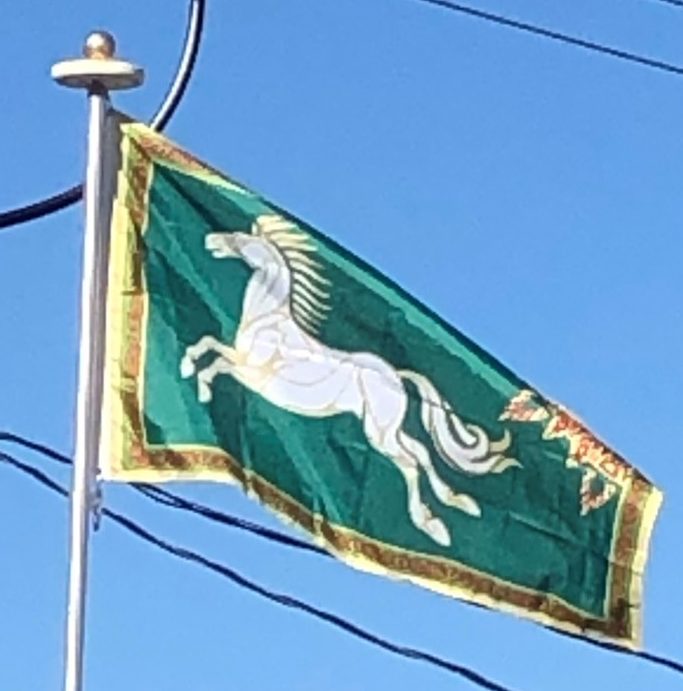In the late 1000s of the Third Age, one such population of Northmen, dwelling in the eaves of Mirkwood, became a separate people under the lordship of Marhari, a descendant of Vidugavia, one of the most powerful princes of Rhovanion. Fighting alongside King Narmacil II of Gondor, his people were defeated by the Wainriders, invaders from the east, and the last remnants of the Northmen were scattered. Marhwini, son of Marhari, took up the lordship of his father and, retreating north with a remnant of his people, became the first chieftain of the people who would become the Rohirrim. Settling first in the vales of Anduin between the Carrock and Gladden Fields, his people began to slowly recover their strength, and became known as the Éothéod, the horse peoples. Marhwini, and later his son Forthwini, continued their alliance with Gondor, fighting the Wainriders and other eastern invaders alongside Kings Calimehtar and Ondoher. Although the Eotheod won pyrrhic victories over their foes while allied to Gondor, and reconquered the lands once held by Lords of Rhovanion, their settlements remained near the Anduin.
The Éothéod:
In the 1970s of the Third Age, after the downfall of the Witch-king and his Kingdom of Angmar, their need for larger lands and the growing menace of Dol Guldur, forced Frumagar (called Frungor in some texts), chieftain of the Éothéod, to lead his people north along the eastern banks of Anduin. They settled near the sources of Anduin, south of the Grey Mountains. Their chief city became Framsburg, which lay in a vale between the rivers Limlight and Greylin. During their time in the far north, the Éothéod and their horses multiplied, and they drove the last remnants of the Hillmen of Angmar out of their lands. Fram, son of Frumagar, slew the dragon Scatha, last of the Great Worms of the Grey Mountains, save Smaug of the Lonely Mountain; thus he won great wealth from the horde of Scatha, as well as renown for the deed. He also earned the hatred of the Dwarves of that region, for they claimed the treasure of Scatha. Fram infuriated the Dwarves by sending them the teeth of Scatha, strung as a necklace, and denying them the rest of the hoard. Some say that for this reason the Dwarves slew Fram, for whom the city of Framsburg was named; for that reason there was no great love between the Rohirrim and Dwarves.
Five hundred years of relative prosperity followed for the Éothéod in the north, and they multiplied into a numerous people, with many farms and horses. In 2501, Léod, chieftain of the Éothéod, captured a white foal in the wilds; this foal would grow to great stature, but remain wild and was not tamed by any man. When Léod decided to mount the horse, it bore him away from his stables and eventually threw him, whereupon Leod’s head struck a rock, killing him. Eorl, son of Léod, despite being just 16 years of age, took up the lordship of the Éothéod, and made it a mission to find the horse that had killed his father. Finally, he tracked down and confronted the stallion, but rather than slay him, Eorl commanded that the horse give up his freedom as a weregild for the killing of Léod. This horse understood the speech of men, and submitted to Eorl, and was named anew Felarof.
The Gift of Calenardhon and the Oath of Eorl:
In the year TA 2509, Eorl received summons from Cirion, Steward of Gondor. The Steward pleaded for help from Gondor’s old allies; as a combined force of Easterlings had invaded the province of Calenardhon and was nigh upon invading the rest of the South Kingdom. Therefore, Eorl surprised even the errand-rider of Gondor by agreeing to come to the aid of Cirion. Though young, Eorl wisely perceived that if Gondor should fall, all the lesser realms of men west of Anduin would eventually fall under the dominion of Sauron. He gathered all men of the Éothéod that could possibly be spared, and, leaving his land at risk of invasion itself, rode south to the aid of Gondor. Despite a prejudice against the Elves that would carry up until the time of the War of the Ring, a protective mist seemed to come out of Lothlórien as the Éothéod journeyed south, rejuvenating horse and rider and shielding their approach from their enemies. Believing that there would be no time for the Éothéod to help his armies, Cirion nonetheless met them in battle on the field of Celebrant, though Gondor’s legions were worsted. All hope seemed lost when an army of Orcs came upon the flank of the army of Gondor, but at that moment Eorl and his cavalry thundered out of the north unlooked for and, smashing the rear of the orc battalions, completely reversed the fortunes of battle. Gondor’s army was saved from destruction, and the riders of the Éothéod continued to pursue their enemies in a great rout across the eastern plains.
